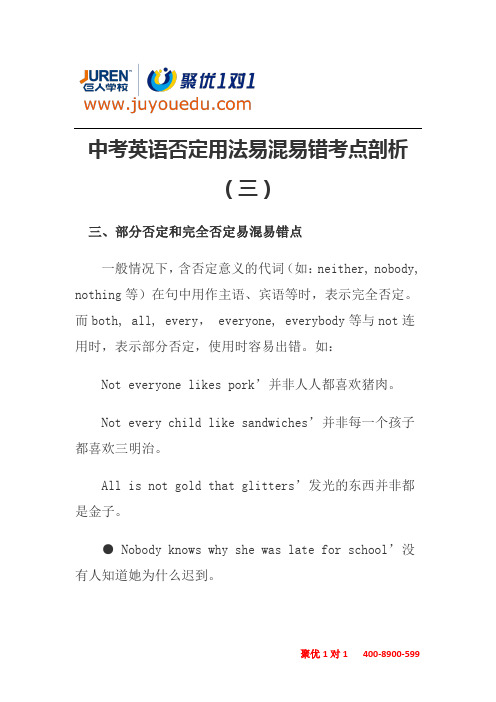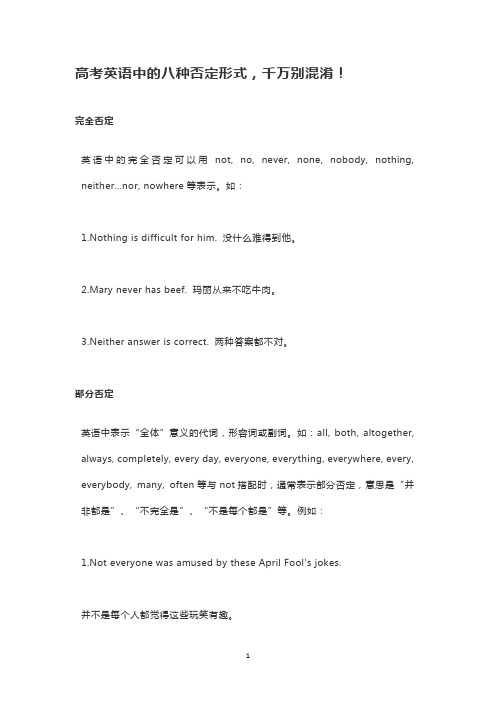中考英语-最易混淆的完全否定与部分否定
- 格式:docx
- 大小:11.48 KB
- 文档页数:6

中考英语否定用法易混易错考点剖析(三)三、部分否定和完全否定易混易错点一般情况下,含否定意义的代词(如:neither, nobody, nothing等)在句中用作主语、宾语等时,表示完全否定。
而both, all, every, everyone, everybody等与not连用时,表示部分否定,使用时容易出错。
如:Not everyone likes pork’并非人人都喜欢猪肉。
Not every child like sandwiches’并非每一个孩子都喜欢三明治。
All is not gold that glitters’发光的东西并非都是金子。
● Nobody knows why she was late for school’没有人知道她为什么迟到。
句中的Nobody不能写成Everyone/ Everybody。
复合代词Nobody在句中用作主语,表示完全否定。
如果把Nobody 改成Everyone/ Everybody ,该句就成了肯定句。
表示完全否定的词除了代词之外,还有形容词、介词、副词等。
如:Nothing makes him change his mind’没有什么能使他改变主意。
I have never seen such wonderful films’我从未看过这么好的影片。
【中考链接】1 (2010年苏州卷)—Wow! You’ve got so many skirts’—But CD#4 of them are in fashion nowA.allB.both ’C.neither’D.none’2 (2011年福州卷)—CD#4 Mary CD#4 Alice has joined the music club because they have no time’—It’s a pityA.Both; andB.Either; or’C.Neither; nor3 (2011年成都卷)There’s CD#4 wrong with the camera’Look! It works well’A.somethingB.nothingC.everything’HJ2 6mm【简析】1’D。

英语中的部分否定与全部否定在英语里有一些用来表示“全体”或“完全”意义的总括词,如all, every(及everybody, everything等),both, always, quite, wholly, entirely, altogether, completely等,凡含有这些词的否定句并非表示全部否定。
如:1. Not all the ants go out for the food. 并非所有的蚂蚁都出外觅食。
2. Money is not everything. 金钱并非万能。
从上面例子中可以看出部分否定有下列两种形式:一、直接把否定词not 放在被否定词之前。
如:3. Not all birds can fly. 并不是所有的鸟都会飞。
4. Not both children are clever. 两个孩子并不都聪明。
5. He doesn’t quite understand. 他并非全部理解。
6. We are not altogether interested. 我们并不完全感兴趣。
二、用not 来否定谓语。
如:7. I can’t catch everything in the book. 我没有完全掌握书中的内容。
8. All that glitters is not gold. 闪光的未必都是金子。
除了上述两种常见的形式外,部分否定还有其它表现形式。
如:9. She can’t sing and dance. (not...and... ) 她并非既会唱歌又会跳舞。
10. It was not for nothing that she spent two years studying skies. (not for nothing) 她花了两年时间研究天体并非毫无收获。
还有含有seldom, hardly, little 等词的句子也有表示部分否定的情况。
11. He seldom asks for leave. 他很少请假。
![部分否定和完全否定[1]](https://img.taocdn.com/s1/m/0373d6de05087632311212d1.png)

部分否定、全部否定和混合否定用法解析英语否定句部分否定、全部否定和混合否定用法解析一、部分否定all,both,every,everybody,everyday,everyone,many,everything,entirely,each、altogether,absolutely,wholly,completely,everywhere,always,often等与否定词not搭配使用。
常常翻译为“并非所有,并不是都。
如:all…not (不全是,不都是),both…not(并非两个都,不是两者都),every…not(不是每个都),not always(不总是,不一定),not often(不经常),not altogether(不全是),not necessarily (未必)等。
We couldn't eat in a restaurant because none of us had any money on us我们不能在饭店吃饭,因为我们谁都没有带钱。
All that glitters is not gold. (莎士比亚语)=Not all that glitters is gold. 闪闪发光的未必都是金子。
Both the windows are not open.两扇窗户并不都是开着的。
Everybody does not believe the rumor.并不是每个人都听信这个谣言的。
They are not always in the office on Sundays.他们不一定每个星期天都在办公室。
The responsibility is not altogether mine.责任并不全在于我身上。
The situation is not necessarily so.情况并非如此。
I agree with most of what you said, but I don't agree with everything.我同意你所说的大部分话,但是我不同意你所说所有话。


高考英语中的八种否定形式,千万别混淆!完全否定英语中的完全否定可以用not, no, never, none, nobody, nothing, neither...nor, nowhere等表示。
如:1.Nothing is difficult for him. 没什么难得到他。
2.Mary never has beef. 玛丽从来不吃牛肉。
3.Neither answer is correct. 两种答案都不对。
部分否定英语中表示“全体”意义的代词,形容词或副词。
如:all, both, altogether, always, completely, every day, everyone, everything, everywhere, every, everybody, many, often等与not搭配时,通常表示部分否定,意思是“并非都是”、“不完全是”、“不是每个都是”等。
例如:1.Not everyone was amused by these April Fool's jokes.并不是每个人都觉得这些玩笑有趣。
2.Food likes and dislikes do not always seem related to nutrition. 对食物的好恶似乎并不总与营养有关。
比较:Nothing makes him happy.(全部否定)没有哪一件事情让他开心。
Not everything makes him happy.(部分否定)并不是每一件事都让他开心。
None of the students went to visit the science museum last week.(完全否定)上周没有一个学生去参观科技博物馆。
Not all of the students went to visit the science museum last week.(部分否定)上周并不是所有的学生都去参观了科技博物馆。
英语中部分否定与全部否定的用法英文回答:Partial Negation (Partial否定)。
Partial negation involves negating only part of a sentence, typically using the adverbs "only" or "just." This type of negation emphasizes a specific element of the statement while leaving the rest unaffected. For example:"The boy only ate half of the pizza." (Only the boy ate half, not others)。
"I just wanted to say hello." (Just wanted to say hello, no other intentions)。
Total Negation (Total否定)。
Total negation, on the other hand, completely negates the entire statement using words like "not," "never," or"no." It expresses a complete absence or lack of something. Examples include:"The boy did not eat the pizza." (He didn't eat any of it)。
"I have never been to Paris." (Not even once)。
中考初中英语八种否定句形式汇总完全否定英语中的完全否定可以用not,no,never,none,nobody,nothing,neither...nor,nowhere等表示。
如:1.Nothing is difficult for him. 没什么难得到他。
2.Mary never has beef. 玛丽从来不吃牛肉。
3.Neither answer is correct. 两种答案都不对。
2部分否定英语中表示“全体”意义的代词,形容词或副词。
如:all,both,altogether,always,completely,every day,everyone,everything,everywhere,every,everybody,many,often等与not搭配时,通常表示部分否定,意思是“并非都是”“不完全是”“不是每个都是”等。
例如:1.Not everyone was amused by these April Fool's jokes.并不是每个人都觉得这些玩笑有趣。
2.Food likes and dislikes do not always seem related to nutrition. 对食物的好恶似乎并不总与营养有关。
比较:Nothing makes him happy.(全部否定)没有哪一件事情让他开心。
Not everything makes him happy.(部分否定)并不是每一件事都让他开心。
None of the students went to visit the science museum last week.(完全否定)上周没有一个学生去参观科技博物馆。
Not all of the students went to visit the science museum last week.(部分否定)上周并不是所有的学生都去参观了科技博物馆。
中考英语否定用法易混易错考点剖析(一)一、否定句中的助动词、be动词易混易错点各种时态都有否定结构,使用时助动词与行为动词,be 动词与人称、时态和数的一致方面易混易错,这里仅以一般现在时和一般过去时为例说明。
● His son often doesnt do his homework’他的儿子经常不做家庭作业。
句中的动词doesn’t不能写成don’t,因为助动词doesn’t和行为动词do一起构成谓语,表示否定。
JP3一般现在时常见的否定结构是:主语 +JP dont/ doesnt + 行为动词 + 其他成分。
在宾语从句中,主句的谓语用一般现在时,从句可以根据需要使用不同的时态。
当直接引语用一般现在时,改为间接引语时,要用一般过去时(直接引语是客观真理或普遍事实时,变为间接引语时则不变。
)如:I don’t know why she was late’我不知道她为什么迟到。
The teacher said to us, “The moon isn’t as far as the sun to us ”→ The teacher told us that the moon isn’t as far as the sun to us’老师对我们说:“月亮没有太阳离我们远。
”● I’d like to go fishing with you if it doesn’t rain tomorrow’如果明天不下雨,我想和你一起去钓鱼。
句中的doesn’t 不能写成won’t,因为这是由if引导的条件状语从句,从句中的谓语动词要用一般现在时代替一般将来时。
如:I’ll go with you if he doesnt come’如果他不来,我就和你一起去。
● Two months isnt short, you may have fun’两个月不短,你可以玩得很开心。
句中的isnt不能写成arent。
初三英语中考语法考点重难点详解(30)不定代词的全部肯定,部分否定,全部否定含义与用法一、全部肯定all + 名词,all of 后跟名词或代词,表示对三个及以上对象的全部肯定,例如:All the boys are playing on the ground.All of them are good players.All of the boys have climbed up to the top.both + 名词、both of + 代词,用于对两个对象进行全部肯定,例如:Both girls came smiling towards me. Both of them have won the game.every - 相关的不定代词表示全部肯定Everybody has entered the classroom. Everyone is silent.Everything is untidy.Every child has got a gift.二、部分否定上面的例句加上not,即为部分否定,请注意如下例句的翻译:Not all of them are good players. = All of them aren't good players.他们并非全部都是上好的球员。
Not both of them are doctors.他们俩并非都是医生。
(他们俩只有一个是医生)如果要表达“他们俩都不是医生”需要用neither:Neither of them is a doctor.I don't like both of them.我不是两个都不喜欢。
Not everything goes well.并非一切都顺利。
三、全部否定对all 的全部否定None of them are good players.他们中没有一个踢得好的。
Nobody can smoke here. 任何人不能在这抽烟。
中考英语- 最易混淆的完全否定与部分否定
一. 完全否定
英语中的完全否定可以用not, no, never, none, nobody, nothing, neither...nor, nowhere 等表示。
如:
1. Nothing is difficult for him. 没什么难得到他。
2. Mary never has beef. 玛丽从来不吃牛肉。
3. Neither answer is correct. 两种答案都不对。
二.部分否定
英语中表示“全体”意义的代词, 形容词或副词。
如:all, both, altogether, always, completely, every day, everyone, everything, everywhere, every, everybody, many, often 等与not 搭配时,通常表示部分否定,意思是“并非都是” “不完全是” “不是每个都是”等。
例如:
1. Not everyone was amused by these April Fool's jokes.
并不是每个人都觉得这些玩笑有趣。
2. Food likes and dislikes do not always seem related to nutrition. 对食物
的好恶似乎并不总与营养有关。
比较:
Nothing makes him happy.
(全部否定)没有哪一件事情让他开心。
Not everything makes him happy.
(部分否定)并不是每一件事都让他开心。
None of the students went to visit the science museum last week. (完全
否定)上周没有一个学生去参观科技博物馆。
Not all of the students went to visit the science museum last week. (部分
否定)上周并不是所有的学生都去参观了科技博物馆。
三.几乎否定
一些半否定词表否定之意。
他们不可再与否定词连用,他们与谓语肯定式连用,构成几乎否定句。
如:hardly, scarcely, seldom, little, few 等词。
例如:
1.I could hardly hear what he said.
我几乎没听见他说了什么
2.There is little water in the bottle, isn't there?
瓶子里几乎没有水,不是吗?
四.双重否定
双重否定句由not + 具有否定意义的词构成,形成“否定+ 否定= 肯定”的语言效果。
双重否定可以表示强调,也可以表示委婉的含义。
例如:
1.Her name can't escape me forever.
我永远忘不了她的名字。
2.The songs never fail to make the children smile.
这些歌曲一向都能使孩子微笑。
五.转移否定
转移否定,即句中的否定虽然出现在谓语部分,否定
范围却不在主句谓语动词本身,而转移到了句子中的
宾语、状语或其他成分上。
这种形式在初中比较常见的有以下两种情况:
1.转移否定多用于表思维活动如:believe(相信), expect(期望), hope(希望),
imagine(想象), think(认为)等。
例如:I don't think he will pass the exam.
我认为他考试会不及格的。
2.主句的谓语动词是表感觉的系动词,通常也用于转移否定句
这类动词有:seem(好像), feel(感觉), appear(出现), look like(看起来像)等。
例如:
It doesn't look like it's going to rain.=It looks like it isn't going to rain. 好
象不会下雨。
No matter how hard he studies, he never seems to be able to pass the
exam. 不管他多么努力的学习,他似乎永远也考不及格。
1.too...to 太⋯⋯而不能
He is too tired to walk. 他太累了,走不动了。
2.more A than B (与其B 不如A)或more than + 含有can 的从句
The young man is more brave than wise.
这年轻人有勇无谋。
The gratitude for your help is more than I can express.
对于你给我的感激之情我无法言表。
3. prefer to do sth rather than do sth
而不愿⋯⋯,例如:
He prefers to write his letters rather than dictate them. 他喜
欢自己写信而不愿口授自己的信。
1. 动词短语表否定意义,如:differ from 与⋯⋯不同prefer...to... 喜欢⋯⋯而不喜欢⋯⋯keep/prevent/stop/protect ... from 阻止,使⋯⋯不keep off 不接近,不让⋯⋯接近lose sight of 看不见例如:
The Great Green Wall stops the sand from moving to the rich land in the south. 绿色长城阻止了风沙吹向南方肥沃的田地。
He lost sight of his wife and went away alone. 他没看见他的妻子,独自走了。
Sally prefers singing to dancing.
莎丽喜欢唱歌而不喜欢跳舞。
2.动词表否定意义
如,absent(缺席), fail(不及格), refuse(拒绝), miss(未赶上,错过), escape (被忘掉)等。
例如:
Why did you absent yourself from school yesterday? 昨天你为什么不来上学?
He missed the 9:30 train and therefore missed the accident.
他没赶上9:30 的那班火车,也因此而逃过那次车祸.
3.介词表否定意义
without(无,没有), against(反对), beyond(超出,无法), except/but(除
外), ⋯⋯past(超过), off(离开), above(超出⋯⋯之外)等。
例如:
I can't finish the work without your help.
没有你的帮助,我完不成这工作。
His conduct has always been above suspicion.
他的行为一直无可置疑。
His stupidity is past all belief.
他的愚蠢简直不可思义。
例如:
WangWei went to bed before he finished his homework.
王伟没完成作业就睡觉了。
Unless you put on your overcoat, you'll catch a cold.
如果你不穿大衣,你就会感冒。